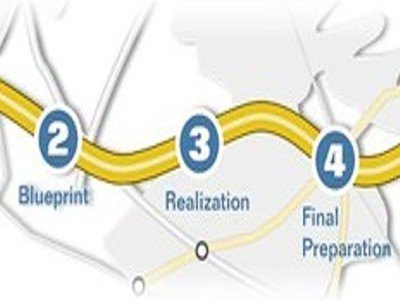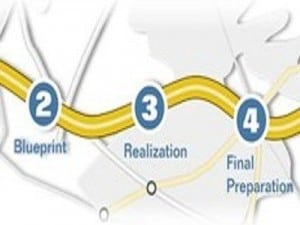 ASAP Methodology Background
ASAP Methodology Background
In the mid 1990’s, SAP had gained significant bad press and publicity around several high-profile project disasters that the company knew were completely avoidable. At that time Oracle, Baan, JD Edwards, and PeopleSoft all had salespeople making the case that SAP was too expensive, too complicated, and too time-consuming to implement. In response, SAP released the ASAP Methodology in the mid-late 90’s (around 1996 or 1997). R&D resources and efforts have since refined, polished, enhanced, and adjusted ASAP Methodology.
The ASAP implementation methodology has leveraged the PMI (Project Management Institute) best practices around project delivery and the Carnegie Mellon CMMI (Competency Maturity Management Integration) approach for maturing the delivery process. The ASAP methodology also includes a number of ITIL (Information Technology Infrastructure Library) components in the Phase 6 Run and the ValueSAP portions of the methodology. Agile techniques are an option that can be “turned on” as needed.
The toolset includes an implementation “Roadmap,” which is a WBS-based project template. This template has full explanations, templates, tools, resources, checklists, etc. Additionally, the original version also included an MS Access and MS SQL Database application for selecting your solution options which would then generate a list of processes, transactions codes, template BPPs, a full SAP centered Blueprint document, etc.
Today, all of that functionality is still available, but it is housed in Solution Manager. The ASAP Roadmap is just one component of the entire ASAP Methodology. The Roadmap is focused on effective Program or Project Management for accelerated project delivery with high-quality results.
My Experiences with the SAP ASAP Methodology
I was originally certified in the ASAP Methodology in 1998 while at Grant Thornton. In that time, I had the privilege of using ASAP on several projects and as the project manager on a few. One consistent result of using the methodology is that projects are delivered, generally on time and on budget.
Every major SAP system integrator claims some methodology, and nearly all of them are similar to, or variations of, the SAP ASAP Methodology.
I have only ever seen significant problems with ASAP when a system integrator started to use the methodology and then abandoned it partway through the project. For one client, I used it as the framework to support a LEAN implementation methodology. That LEAN methodology has served as an ongoing framework to significantly accelerate numerous rollouts at probably a quarter of the normal implementation cost of other SAP projects. The client project manager and ASAP tools facilitated this framework.
Starting with the ASAP Methodology
Even before the first consultant comes on board, the ASAP methodology provides templates and resources to cover key project and program management areas, including the following:
- communication planning,
- decision making,
- risk management,
- project management master planning,
- resource planning,
- steering committee tools,
- external links to best practice resources for reference (PMI, ITIL, Internal SAP, etc.).
Why ASAP Instead of a System Integrator Methodology?
First, I have nothing against the system integrator methodologies. Unfortunately, my experience has been that while the integrators have them, and may start with them, they rarely stick to them throughout the project. Since it is their methodology, you have little or no insight to cross-check or validate their methodology use. With ASAP, it is yours to use as an SAP customer, and you have full insight into it and control over its use.
One of the primary reasons for using the SAP ASAP Methodology is to address the mountain of R&D spend, development, adjustment, and support that is common in SAP. Every SAP client (large or small) who uses the ASAP methodology can avoid the proprietary methodology lock-in that the system integrators try to walk out the door with. Additionally, you own it as part of the standard Solution Manager offering.
As you likely know, Solution Manager is already a required part of your SAP landscape. The SAP Solution Manager portion of the ASAP Methodology can house key items related to scope, configuration, documentation, the implementation roadmap, and key deliverables. As the system integrator rolls off the project, you have a centralized, SAP-specific repository for any future employees, support, upgrades, etc. You do not get that with a “custom” system integrator methodology, which is likely based significantly on SAP’s ASAP Roadmap to begin with. Additionally, using an SI methodology will not provide you the full configuration and development scope monitoring tools.
The entire ASAP Methodology is part of your application licensing and support you pay for. Why not at least take it for a test drive?
For more information on the SAP ASAP Methodology for SAP customers, use your SAP OSS ID and log onto http://service.sap.com/asap .


 ASAP Methodology Background
ASAP Methodology Background



Thanks for the informative article on ASAP. Having led the external (non-SAP) team that developed the original ASAP tools, I enjoyed reading your post. I remember Grant Thornton as one of the early ASAP users.
Thank you sir for your insight and the early contributions. It has certainly come a long way from the early days as now it is an integrated part of Solution Manager. As SAP went aggressively after the mid-market Grant Thornton was one of the companies they partnered with to try to penetrate the space. SAP had a requirement for “TeamSAP” to have a pretty large percentage of the consulting firms certified in the early ASAP Methodology… Unfortunately it seems to have fallen out of favor for many who are uncomfortable with very structured methodologies.
Thanks again for the feedback!
Hi Bill prompted by your recent blog and now this one, I started a poll on Jon ERP’s SAP Consulting Skills Group on the topic of whether or not self-proclaimed SAP Project Managers had head formal ASAP training. Would be good if you could encourage your followers to contribute.
The poll can be found at:
http://www.linkedin.com/groups/lot-SAP-Project-Managers-mention-141773%2ES%2E89087710?qid=35a5f4dd-e787-4bf5-b1d1-0b43706160e8&trk=group_most_recent_rich-0-b-ttl&goback=%2Egmr_141773
Cheers
Bryan